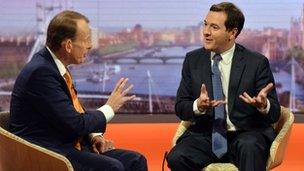No re-run of Syria vote
- Published

Mr Osborne told Andrew Marr that a military response was "not going to be open to us"
David Cameron and Ed Miliband could have used President Obama's decision to postpone military strikes against Syria, while he seeks congressional approval, as an opportunity to think again about Britain's involvement.
After all, Parliament's "no" vote was, in theory, a call for more time, more evidence and more of a "UN moment" before military action - all of which could be delivered during the Obama pause.*
However, the prime minister's closest ally, George Osborne insisted this morning that Parliament had spoken and that was that.
Even before he did so, the shadow foreign secretary, Douglas Alexander, stressed that David Cameron had given his word and put his personal authority behind a promise that Britain would not take part in military action.
The truth is that both parties' leaderships fear a re-run.
Brave face
Both know that their parties are divided on the issue. Both know that their instincts are at odds with the public and parliamentary mood.
A fresh vote in two weeks' time after the UN weapons inspectors' report, after the UN Security Council had spoken, after all the evidence had been assembled would be very high risk for David Cameron and Ed Miliband.
Defeat could be terminal for the prime minister. Victory would, once again, depend on support from Labour which, if it were given, would rip up the new bond formed between the Labour leader and most of his party.
So, instead of trying again to forge a consensus, the prime minister will stress that he stuck to his principles but showed that he was prepared to listen.
He will attack Ed Miliband for playing political games.
The leader of the Opposition will respond that it was the occupant of Number 10's arrogance and incompetence that are to blame, while presenting himself as the "Love Actually" leader who's willing to say "no" to our closest ally.
Both are simply putting a brave face on an outcome they didn't want and they didn't envisage.
* Remember that the Labour leader has never opposed military action in principle. He has always said that he saw the use of chemical weapons as crossing a red line and that a military response could, in certain circumstances, be justified. His defence spokesman, Jim Murphy, said today that he believed that Assad was responsible.